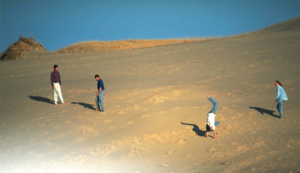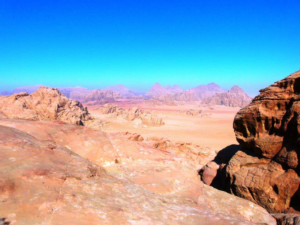Submitted by Lia Naor, PhD Candidate for the Positive Living Newsletter (November 2016). Read the rest of the newsletter here.
When Therapy Takes a Hike
 With a rich background in therapy and wilderness studies, it was only natural for me to combine my love of nature and soul work which led to my professional definition as a Nature Therapist. Years of therapeutic work with groups and individuals in nature emerged later as a life dedication to ‘ways of knowing’—a center for the study, experience, and research of human development through nature.
With a rich background in therapy and wilderness studies, it was only natural for me to combine my love of nature and soul work which led to my professional definition as a Nature Therapist. Years of therapeutic work with groups and individuals in nature emerged later as a life dedication to ‘ways of knowing’—a center for the study, experience, and research of human development through nature.
At the time, I thought I had invented a new therapeutic approach, but, to my joy, I discovered various therapeutic approaches that bring nature into the therapeutic milieu as a central construct of the healing process. These include Horticultural therapy (Sempik, Aldridge, & Becker, 2003; Simson & Straus, 1998), Wilderness and Adventure therapy (Davis-Berman & Berman, 1989; Schoel & Maizell, 2002), Ecotherapy (Burls, 2007; Burls & Caan, 2005; Clinebell, 1996), Ecopsychology (Roszak, Gomes, & Kanner, 1995), and Nature Therapy (Berger & McLeod, 2006). In contrast to common notions in psychotherapy, nature-based therapies regard the human potential for wholeness as involving more than the intrinsic psychological aspects of self to include an expansion, awareness, and relationship not only with the human world, but with all that exists.
 As I write this introduction, what hits me as meaningful to my professional and personal becoming has to do with a deep yearning to find my place of belonging in the world. Although this yearning brought me great distress, for it was nurtured by loneliness and lack of personal meaning, it pushed me assiduously to seek a place in which I would feel I belonged or ‘at home.’ [Here I distinguish between desire which has to do with a more materialistic and instant satisfaction compared to yearnings of the soul]. My yearning to connect and belong eased when I began to cultivate a deep and intimate relationship with nature. I remember the moment when sleeping alone in the desert in a narrow canyon under a sky of stars that I felt totally at home, connected and belonging to the natural elements which I felt an innate part of. That understanding was profound not only because it connected me to the world I live in, but also because I gained an understanding regarding our yearnings (ailments) that are not to be cured or decreased but to be followed in the journey to personal fulfillment and wholeness (health).
As I write this introduction, what hits me as meaningful to my professional and personal becoming has to do with a deep yearning to find my place of belonging in the world. Although this yearning brought me great distress, for it was nurtured by loneliness and lack of personal meaning, it pushed me assiduously to seek a place in which I would feel I belonged or ‘at home.’ [Here I distinguish between desire which has to do with a more materialistic and instant satisfaction compared to yearnings of the soul]. My yearning to connect and belong eased when I began to cultivate a deep and intimate relationship with nature. I remember the moment when sleeping alone in the desert in a narrow canyon under a sky of stars that I felt totally at home, connected and belonging to the natural elements which I felt an innate part of. That understanding was profound not only because it connected me to the world I live in, but also because I gained an understanding regarding our yearnings (ailments) that are not to be cured or decreased but to be followed in the journey to personal fulfillment and wholeness (health).
From this perspective, deep unsettling yearnings—even when painful and dismantling among healthy humans—are an inner calling to live a fuller life. These yearnings, when dealt with therapeutically, may be utilized as a life force, pushing one to experience deep relationships including meaningful connections to other humans and the wider natural world.
In this respect, depression, loneliness, loss of meaning and vitality, and indifference may be common in today’s self-sustained and individualistic modern lifestyle distant from nature. Nature, as the human place of evolution and development, has served as a place of learning, offering endless opportunities by which one may acquire personal and existential knowledge through experience. Therefore, it is conceived as “one of the most basically important ingredients of human psychological existence” (Searles, 1960, p. 27), and a loss of direct experience with nature may nurture the human yearning to live a life of meaning connected to one’s self and the world. From this perspective, the ‘ailment’ in need of healing has much to do with the fragmented, unfulfilled self or need for wholeness.
Cultivating wholeness through nature is a unique learning process, involving the discovery and development of unknown and unconscious aspects of self revealed by nature. The unique and profound opportunity for personal change and development in nature has been attributed to the evolutional human design, as well as to nature’s unique characteristics (restorative environment). Taking this view, returning to wholeness involves cultivating awareness and an intimate, meaningful relationship with the various aspects of the self as well as with wider aspects and dimensions of life represented by nature. Integrating these physical, psychological, and spiritual aspects contribute to being a fully-developed human being. In this way, wholeness is cultivated, giving the feeling that one is an intrinsic part of the ‘web of life’ and becoming aware that one’s existence is worthwhile.
The notion that one sincerely seeks and needs wholeness, internal and external fulfillment, and real meaning for healthy development and growth is not new and can be found in the work of classic humanists. These notions have gained serious attention within the field of positive psychology (Seligman, 1998). Furthermore, second wave positive psychology (PP 2.0), has gone a step further, taking a more inclusive perspective arguing that full human development can best be described as the joining and appreciation of conceptual opposites, holding the complexity and paradox of life in its totality (Lomas & Ivtzan, 2015; Ryff & Singer, 2003; Wong, 2012).
 Witnessing profound processes of personal development and transformation in nature has instigated a deep desire to understand the process by which a fragmented self or ‘way of being’ develops into a more connected and expansive whole. Deciphering nature’s unique role in personal development has enticed my academic journey as a researcher of personal positive transformation especially as occurring in nature.
Witnessing profound processes of personal development and transformation in nature has instigated a deep desire to understand the process by which a fragmented self or ‘way of being’ develops into a more connected and expansive whole. Deciphering nature’s unique role in personal development has enticed my academic journey as a researcher of personal positive transformation especially as occurring in nature.
Nature as a vast, rich, and multi-dimensional setting offers abundant opportunities and landscapes that cultivate a knowing of the many dimensions internal and external of human wholeness in a concrete and embodied way. Therefore, to know nature is to gain a deep and intimate knowing of self and the world from a new and expansive perspective. I use the term to know not as the acquisition of factual knowledge but as a personal discovery that may have profound impact on one’s life. In this way, to know nature is to experience deep rapport and relationship with something greater than us, while becoming aware that we are also part of this greatness, evoking the opportunity to experience an expansion of consciousness contributing to a sense of meaning and belonging to the world in which we live. Of course, this does not stand true for every encounter in nature, but, through this lens, it is possible to become more aware of opportunities for personal wholeness that nature offers.
Lia Naor is a PhD student in the Department for Counseling and Human Development at the University of Haifa, Israel. Lia holds a BA in social work and an MA in drama therapy. She is a licensed nature guide and for the past 20 years has combined her love and experience in the field of nature with deep soul work through ‘ways of knowing’—a model for therapeutic quests in nature that she developed. She teaches nature therapy, lectures on related topics, and has a private practice working with individuals and groups seeking change, wholeness, and actualization. Lia teaches and studies the therapeutic aspects of nature in the context of positive change as a researcher, teacher, student, and lover of nature and humanity.
Member Bio
 Lia Naor is a PhD student in the Department for Counseling and Human Development at the University of Haifa, Israel. Lia holds a BA in social work and an MA in drama therapy. She is a licensed nature guide and for the past 20 years has combined her love and experience in the field of nature with deep soul work through ‘ways of knowing’—a model for therapeutic quests in nature that she developed. She teaches nature therapy, lectures on related topics, and has a private practice working with individuals and groups seeking change, wholeness, and actualization. Lia teaches and studies the therapeutic aspects of nature in the context of positive change as a researcher, teacher, student, and lover of nature and humanity.
Lia Naor is a PhD student in the Department for Counseling and Human Development at the University of Haifa, Israel. Lia holds a BA in social work and an MA in drama therapy. She is a licensed nature guide and for the past 20 years has combined her love and experience in the field of nature with deep soul work through ‘ways of knowing’—a model for therapeutic quests in nature that she developed. She teaches nature therapy, lectures on related topics, and has a private practice working with individuals and groups seeking change, wholeness, and actualization. Lia teaches and studies the therapeutic aspects of nature in the context of positive change as a researcher, teacher, student, and lover of nature and humanity.
References
- Berger, R., & McLeod, J. (2006). Incorporating nature into therapy: A framework for practice. Journal of Systemic Therapies, 25(2), 80-94.
- Burls, A., & Caan, W. (2005). Human health and nature conservation: Ecotherapy could be beneficial, but we need more robust evidence. British Medical Journal, 331(7527), 1221-1222.
- Burls, A. (2007). People and green spaces: Promoting public health and mental well-being through Ecotherapy. Journal of Public Mental Health, 6(3), 24-39.
- Clinebell, H. (1996). Ecotherapy: Healing ourselves, healing the earth. New York: Haworth Press.
- Davis-Berman, J., & Berman, D. S. (1989). The wilderness therapy program: An empirical study of its effects with adolescents in an outpatient setting. Journal of Contemporary Psychotherapy, 19(4), 271-281.
- Ivtzan, I., Lomas, T., Hefferon, K., & Worth, P. (2015). Second wave positive psychology: Embracing the dark side of life. New York, NY: Routledge.
- Roszak, T. E., Gomes, M. E., & Kanner, A. D. (1995). Ecopsychology: Restoring the earth, healing the mind. San Francisco, CA: Sierra Club Books.
- Ryff, C. D., & Singer, B. (2003). Ironies of the human condition: Well-being and health on the way to mortality. In L. G. Aspinwall, & U. M. Staudinger (Eds.), A psychology of human strengths (pp. 271-287). Washington, DC: American Psychological Association.
- Schoel, J., & Maizell, R. S. (2002). Exploring islands of healing: New perspectives on adventure based counseling. Beverly, MA: Project Adventure.
- Searles, H. F. (1960). The nonhuman environment. in normal development and in schizophrenia. New York, NY: International Universities Press.
- Seligman, M. E. P. (1998). What is the good life?APA Monitor, 29(10), 2.
- Sempik, J., Aldridge, J., & Becker, S. (2003). Social and therapeutic horticulture: Evidence and messages from research. Reading, UK: Loughborough University Press.
- Simson, S., & Straus, M. C. (1998). Horticulture as therapy: Principles and practice. New York: Food Products
- Wong, P. T. P. (2011). Positive psychology 2.0: Towards a balanced interactive model of the good life.Canadian Psychology, 52(2), 69-81.

 Meaning Conference 2025 will be the INPM’s first in-person conference with a virtual option after the pandemic.
Meaning Conference 2025 will be the INPM’s first in-person conference with a virtual option after the pandemic.